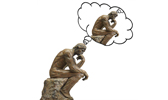
It is ironic that the nature of consciousness still remains a ‘mystery’ in our age of science and technology. After all, these fields themselves required ‘conscious’ focus and effort to become credibly established. Yet, attempts to study consciousness on a scientific, medical, or technological basis only ‘prove’ that these fields of discipline are not up to the task.
Indeed, evidence suggests that many people do not even want to know or understand the real nature of their conscious being, since the answers are not always comforting, particularly when compared to long held beliefs that consciousness can somehow exist without physical form.
Some recent news headlines we examine tell the story: “Scientists spur brain activity in dead pigs” / “Does consciousness continue after the brain dies?” / and “Why can’t the world’s greatest minds solve the mystery of consciousness?”
To understand the nature of consciousness, we find ourselves forced to rely on the disciplines of philosophy and psychology, for science and medicine have never been able to quantitatively measure or pinpoint anything capable of being studied that we call ‘consciousness.’
However, this does not represent a shortcoming of the aforementioned disciplines. Though consciousness can be described in many ways, it is not possible to ‘prove’ consciousness in the same way that one can ‘prove’ a scientific theory or demonstrate the results of a scientific experiment.
The secret to unlocking the mystery of consciousness lies in understanding its axiomatic nature. An axiom is a fact that cannot be proven true or false since any attempt to do so would require the acceptance of a contradiction on the ‘false’ side of the argument. Reality does not allow contradictions, and when encountered, a ‘contradiction’ merely represents an error on the part of the agent.
For example, the concept of ‘existence’ is axiomatic. It cannot be proven false since in doing so, a contradiction would arise. After all, if one could ‘prove’ that existence did ‘not’ exist, then the ‘proof’ itself would not exist.
So too it is with the concept of consciousness. In any attempt to ‘disprove’ consciousness, consciousness is required. Hence, one is confronted with a contradiction and the argument fails before it is even attempted.
Axioms may seem counterintuitive, but reality demonstrates that they describe our conscious nature in a way that is Just Right.


Sorry, the comment form is closed at this time.